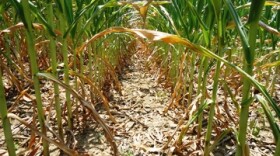Kentucky's Agriculture Commissioner is asking the federal government to reconsider its latest set of rules regarding industrial hemp.
Last month, Ryan Quarles said he would be reviewing the U.S, Department of Agriculture's 'Statement of Principles' to see how it relates to Kentucky's own pilot hemp research program.
A provision in the 2014 Farm Bill allowed states to grow hemp for research purposes, but did not remove the cannabis-related plant from the controlled substances list, giving federal agencies authority over restrictions.
In a letter sent yesterday to the USDA, Quarles says he now has several objections in that several aspects of the principles contradict Congress' original intent and "could hinder industrial hemp's economic potential" in Kentucky.
Quarles says the new rules name the only economically viable parts of the hemp plant as the "fiber and seed" to only be used for industrial applications. Quarles says that over half of Kentucky's hemp acreage harvests cannabidiol - a hemp oil that does not come from either the fiber nor seed, and that the 'industrial application' proviso would also mean hemp could not be used in a drug, as a food ingredient or for artistic purposes.
He says another apparent broadening of a definition for measuring ‘delta-9 tetrahydrocannabidol’ - or THC - could create confusion amongst farmers and processors about the plant’s intended uses and permitted THC levels. The USDA's statement omits the portion 'delta-9' from the tetrahydrocannbidol definition, which Quarles says could potentially "render most, if not all, variants of industrial hemp ineligible for study in research pilot programs."
He also takes issue with the USDA’s declaration that hemp seeds and plants may not be transported across state lines, though Congress prohibits federal funds being used on such enforcement in the 2014 Farm Bill.
Kentucky's industrial hemp pilot research program began three years ago and incorporates more than 2,000 acres across the state, half of which is used to harvest cannabidiol.









